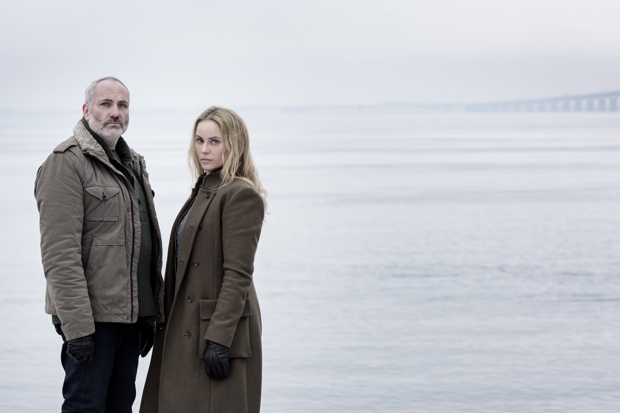This Saturday night I’ll be staying in to watch the final two episodes of The Bridge, the Scandinavian detective series on BBC4. I missed the first season of The Bridge when it was broadcast on BBC4 in 2012, but have since caught up on all ten episodes, as well as the first eight of season two in the past fortnight. I highly recommend it.
The bridge of the title is the one that links Malmö to Copenhagen, and the two central characters, a Swedish detective called Saga and a Danish detective called Martin, flit back and forth between the two cities. It’s hard for English viewers to keep track of which country they’re in because the two languages sound so similar. Nevertheless, you come away with a strong impression of Scandinavian society, both its strengths and weaknesses.
The programme is beautifully shot and, visually, both Malmö and Copenhagen are attractive. Both cities are great advertisements for modern architecture, as is the bridge that links them, the longest in Europe. They’re also much cleaner than London, in part because they’re less populous — another thing that makes them appealing. The impression you get is of a culture that values public spaces more highly than we do.
But in general the series isn’t a particularly ringing endorsement of Scandinavian social democracy. Judging from the backdrop to the crimes the detectives are investigating, Sweden and Denmark are beset by the same problems as Britain — poverty, drug addiction, homelessness, mental illness, etc. And when it comes to political extremism, they’re worse off than us if season two is anything to go by, with eco-terrorists constantly blowing things up and murdering people.
The most striking difference is that these Scandinavian countries have made a lot more headway than us when it comes to gender equality, but the makers of the programme are clear-eyed about the cost of such progress. Saga has Asperger’s syndrome, and it’s hard to escape the conclusion that the writers have saddled her with this disability in order to make a point about successful Scandinavian career women. Because she’s neurologically incapable of empathising with anyone, she behaves exactly as a man would in a more traditional society. She’s hyper-rational and lacks the soft, feminine skills that are required to excel in the modern workplace. Indeed, she often has to rely on her male partner for advice on how to behave in a more diplomatic way. In season two, she has a live-in partner and the roles in the relationship are reversed. He’s the needy, emotionally incontinent ‘wife’ and she’s the distant, cold-blooded ‘husband’.
Martin, by contrast, is a bit of a schlub. When we’re first introduced to him at the beginning of season one he’s just had a vasectomy, presumably a symbol of the emasculation of Scandinavian men. As a detective, he’s not a patch on his partner — he plays Watson to her Holmes. He’s just an average Joe whose career success depends in part on a sympathetic female boss.
At least Martin isn’t literally impotent — unlike virtually every other male in the programme. Again and again, we see liberated women ask their male partners for sex, only for them to decline on the grounds that they’re ‘too tired’ or ‘have work to do’. On my trips to Scandinavia, I’ve often heard women complain that their menfolk are undersexed and they blame it on their inability to cope with gender equality. Again, it’s hard to avoid the conclusion that the programme’s makers are highlighting some of the less attractive consequences of female emancipation.
Which isn’t to say that The Bridge is a conservative show. Rather, it’s a programme that seems to be genuinely ambivalent about the Scandinavian model. On balance, I think I prefer Britain. It’s not the equality of the sexes I mind — Britain will soon be indistinguishable from Denmark and Sweden in that respect — but the blandness that seems to go hand in hand with a more egalitarian society. The two protagonists are decidedly unheroic, seemingly incapable of tackling serious crime. Compared with their British or American equivalents, they’re downright useless. No doubt this is more true to life and our TV detectives are figures of fantasy, but so what? Nothing wrong with a bit of escapism. It’s almost as if depicting fictional characters as heroic individuals is forbidden in Denmark and Sweden, like drawing the Prophet in Islamic countries. I wouldn’t say I prefer The Professionals to The Bridge. But I prefer a society in which you’re still allowed to venerate Bodie and Doyle.







Comments